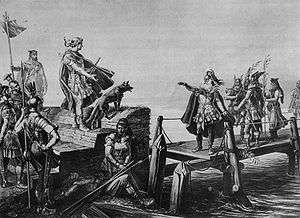Battle of Bibracte
| ||||||||||||||||||||||||||||||
The Battle of Bibracte was fought between the Helvetii and six Roman legions, under the command of Gaius Julius Caesar. It was the second major battle of the Gallic Wars.
After following the migration of the Helvetii and defeating them, Caesar, around 20 June, moved towards Bibracte (approximately 18 miles away from their camp) to obtain the supplies promised by his allies, the Aedui. Dumnorix, an Aedui chieftain opposed to the Romans, had been delaying supplies from reaching Caesar's army.[1]
Informed by deserters of Lucius Æmilius, commander of the cavalry, the Helvetii took this occasion to turn and harass Caesar's rear guard.[1] When Caesar observed this, he sent his cavalry to delay the attack. He placed the Seventh (Legio VII Claudia), Eighth (Legio VIII Augusta), Ninth (Legio IX Hispana), and Tenth legions (Legio X Equestris), organized in Roman fashion (triplex acies, or "triple battle order"), at the foot of a nearby hill, the top of which he occupied himself, along with the Eleventh (Legio XI Claudia) and Twelfth (Legio XII Fulminata) Legions and all his auxiliaries. The baggage train was also assembled near the summit, where it could be guarded by the forces present there.
After having driven off Caesar's cavalry and with their own baggage train secured, the Helvetii engaged "In the seventh hour", approximately noon or one o'clock. According to Caesar, his hill-top battle line easily threw back the Helvetii onslaught by using pila (javelins). The legions then counterattacked, driving the Helvetii back towards the hill where their baggage train sat.[1]
While the legions pursued the Helvetii across the plain in between the hills, the Boii and Tulingi arrived with fifteen thousand men to assist the Helvetii, flanking the Romans on one side. At that point the Helvetii returned to the battle in earnest. When the Tulingi and the Boii started circumventing the Romans, Caesar regrouped his third line to resist the assault of the Boii and Tuligni, keeping his primary and secondary committed to chasing the Helvetii.
The battle lasted many hours into the night until the Romans finally took the Helvetic baggage train, capturing both a daughter and son of Orgetorix. According to Caesar, 130,000 enemy personnel escaped into the night. Unable to pursue on account of battle wounds and the time it took to bury the dead, Caesar rested three days before he followed the fleeing Helvetii. These, in turn, had managed to reach the territory of the Lingones within four days of the battle. Caesar warned the Lingones to not assist them, prompting the Helvetii and their allies to finally surrender.
Caesar claimed that 130,000 of the Helvetii and her allies escaped yet only 110,000 returned home.
Also according to Caesar the census totals of the tribes at the start of the war were:
| Tribe | Population census |
|---|---|
| Helvetii | 263,000 |
| Tulingi | 36,000 |
| Latobrigi | 14,000 |
| Rauraci | 23,000 |
| Boii | 32,000 |
| Total | 368,000 |
| Combatants | 92,000 |
References
| Wikimedia Commons has media related to Battle of Bibracte. |
| Wikimedia Commons has media related to Gauls. |
- Battle of Bibracte in German, French and Italian in the online Historical Dictionary of Switzerland.
- Goldsworthy, Adrian. Caesar: Life of a Colossus. New Haven: Yale University Press, 2007. 220-223.
- Caesar's Gallic War - direct translation from Latin

